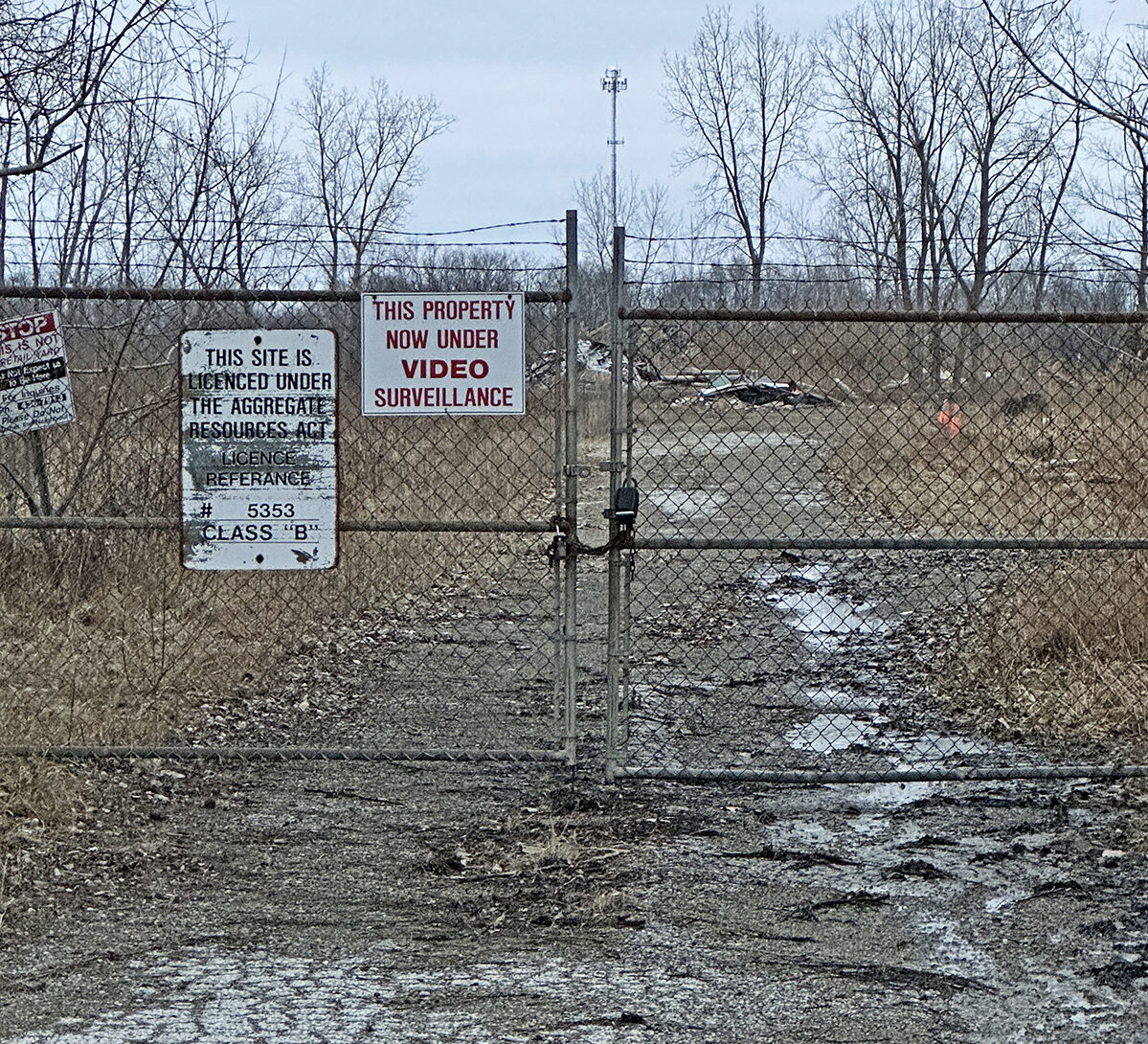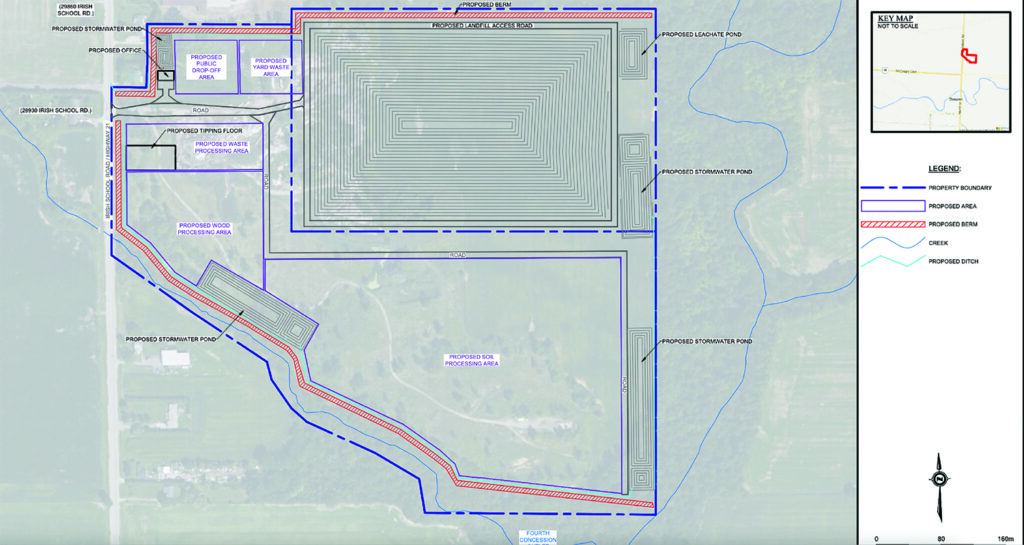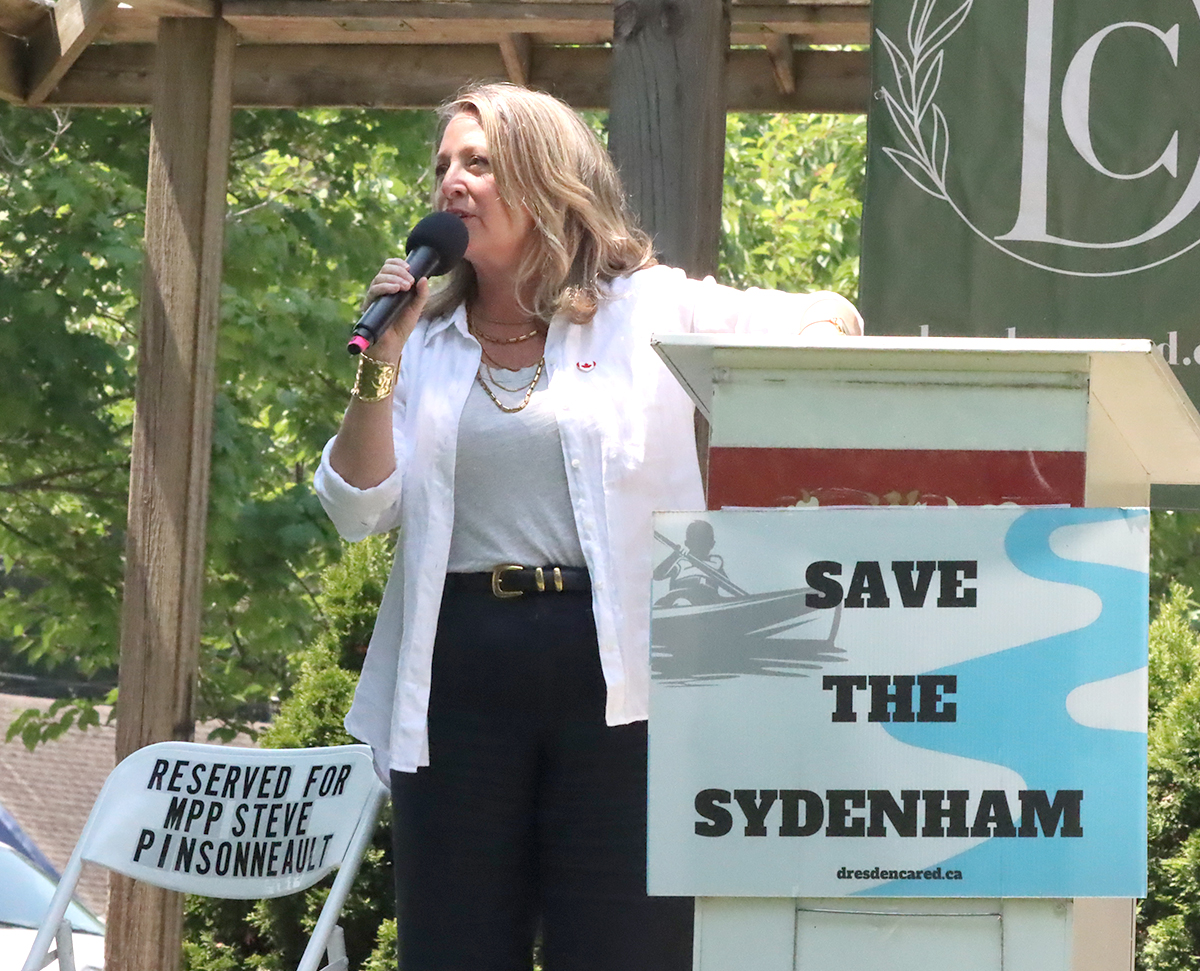Petrolia native hopes to win UFC contract

York1 landfill proposal raises groundwater, gas concerns with MOE
March 6, 2024
Heather Wright/The Independent
The Ministry of the Environment voiced concerns about groundwater quality and methane gas in a review of York1 Environmental Waste Solution’s plan to revive the dormant Dresden Dump.
That information comes from documents about the proposal to build a new landfill on the Irish School Site released by the ministry to The Independent this week.
York1 has caused a stir in both Dresden and Lambton County with its plans to revive the site one kilometre north of Dresden and south of the Lambton County border. The plan calls for up to 6,000 tonnes of waste – construction materials, soil, residential waste and even hazardous waste – to come to the landfill nestled among houses along the former Highway 21.
That could generate traffic of up to 700 trucks daily according to York1’s separate proposal on the recycling centre posted to the Environmental Registry of Ontario Jan. 31.
York1 filed a separate proposal for the landfill portion of the project.
According to the detailed documents submitted to the Ministry of the Environment, Conservation and Parks, the company plans to build a new 20 acre landfill on the north east side of the property.
The landfill will be a “minimum 30 meters” from the property boundary and 100 meters from the nearest waterbody – Molly’s Creek.

A diagram shows the proposed landfill on the edge of the property with an access road and berm separating it from the edge of the property. It takes up about 40 per cent of the property and is about 200 to 250 meters from Irish School Road.
Another 40 per cent of the property to the south will be used for soil processing.
A series of four storm water ponds are proposed to catch rainfall and divert it from the landfill area.
York1 says the system will filter out any silt and contaminates before draining into Molly Creek. The company says the stormwater ponds should be monitored twice a year; the ministry believes it should be at least four times a year.
In March 2021, the ministry voiced concerns about the groundwater in the area and asked York1 to do a detailed hydrological study.
Bruce Harman, an engineer with the ministry, reviewed the document. He agrees with York1’s conclusion that “the landfill – past and present – should not alter the ground water or surrounding wells” but he voices concerns about naturally occurring methane which could pose problems for up to 24 homeowners with wells in the region.
“The owner/operator should also ensure that future planned activity for the expanding landfill site will not alter the accumulation or flow migration of the naturally occurring gases at depth that may become a concern for the neighbour properties (water wells) located at least 500 meters from the property.
“The sampling and analysis of water from the domestic water wells located on residential properties, as a minimum, immediately adjacent to the southwestern landfill property boundary should occur as permitted by the water well owners, given the reported flow direction of the contact aquifer is from beneath the landfill property in a southwest direction toward these properties.
“Sampling of all domestic water wells in the vicinity may be more prudent given there are so many water wells in close proximity to the landfill and the groundwater flow direction has yet to be confirmed with additional monitoring events,” writes Harman.
In an interview with The Independent, George Kirchmair, vice president of York1, said building the new, engineered landfill would protect the area’s ground water.
“In addition to the existing clay, there’s two impermeable layers that don’t let any seepage go through. So, what we’re proposing is a million times better than what’s existing right now. There’s just buried waste that has no controls now. We would put in a landfill that’s engineered…the leachate is all collected; nothing gets out.”
York1’s proposal also says “the nature and quantity of landfill gas generated at the site is not likely to be a significant concern” because of the clay around the site and the nature of the waste being accepted.
It appears from the correspondence included in the information provided by the ministry, York1has not satisfied officials concerns yet. A Dec. 18, 2023 letter from the ministry says “A number of items are still outstanding including but not limited to a survey of the residential wells in the vicinity of the site. Additional Hydrogeological work is required, however that additional work will be completed on an ongoing basis.”
Harman also raises the issue of a water well on the landfill property which was decommissioned. In his report, Harman says while it was capped off, some of the well casing may still be in the ground. He’s concerned that could be a pathway for leachate to get into the groundwater in the future. That, he says will need to be fixed.
The ministry also questioned the depth of the clay in the area where the landfill is to be built. MOE wants to know how much of the clay has been removed, specifically the area of the future planned landfilling operations.
“My understanding is the previous tile works were very shallow in nature. So, we haven’t found any areas of deep fill that shows the claim has been scoped out to deep depth,” says Kirchmair.
The company’s survey show three pockets of past landfilling activity on the property, including one which is on the St. Clair Region Conservation Area flood zone. Those areas will be dug up and moved to the new landfill where Kirchmair says “there has been no excavated clay.”
York1, in its proposal, says “Due to a lack of municipal infrastructure to support leachate management, the site will operate with a leachate lagoon with the support of hauling trucks to remove sediment.” It adds the company will focus on reducing the leachate generated by draining stormwater into ponds surrounding the landfill.
York1 flagged dust control as one of the larger issues neighbours will face with the proposed landfill.
Kirchmair says much of the landfilled material will be excess soil which cannot be recycled. That could mean some dust control problems. York1 says among other things, the roads surrounding the landfill will be paved to keep the dust down in the region.
The outline of the landfill expansion project was listed on the Environmental Registry of Ontario Feb. 26. The public can comment on the landfill proposal until April 11.
FAST FACTS OF YORK1’S LANDFILL PROPOSAL
- 20 acre landfill to be built on the northwest part of the property
- 30 meters from the property boundary
- Surrounded by an 80 foot berm
- Four stormwater holding ponds
- A lagoon leachate collection system
- Operation of landfill equipment will not be undertaken prior to one hour before and no later than two hours after the approved hours of operation
- Surface water and ground water to be monitored twice a year
- Residential well water monitoring once a year
- Leachate to be collected in a pond to evaporate naturally with remainder pumped out and taken to an licensed liquid industrial waste disposal facility or will be treated on site and then taken to a municipal waste water facility.
- Dust will be reduced by paving landfill roads, dust suppressant, and planting vegetation
- Odour issues to be dealt with by removing source of odour, adding more cover to landfill and use of de-odourizers
- Landfill staff will be trained to detect hazardous waste and would be authorized to turn it away at the gate

Petrolia native hopes to win UFC contract
July 4, 2025
Read More

Cattlemen, conservation authority reach agreement for pasture
July 4, 2025
Read More

Sarnia senior dies in 402 crash
July 4, 2025
Read More

Dresden “the canary in the coal mine” says Stiles
July 4, 2025
Read More
